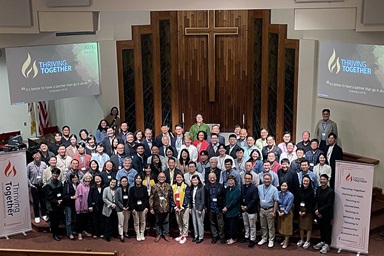Bishop Rodolfo Juan of the Manila Episcopal Area expressed support for the resumption of peace talks between the Republic of the Philippines government and the National Democratic Front.
"I appeal to the pastors and churches to keep on praying and to add voice in calling from the parties to go back to the negotiating table according to the agreements they have signed,” Juan said during an ecumenical forum entitled “Peace Talks: Prospects and Challenges.” The forum was a prelude to the ongoing formal peace talks Aug. 22-27 between the Philippine government and the revolutionary organization in Oslo, Norway.
The Aug. 16 forum at St. Martin De Porres Hall in Quezon City, was initiated by the Pilgrims for Peace, an alliance of sectors and churches advocating for just and lasting peace. The Manila Area of The United Methodist Church was one of the sponsors.
The Philippine government under the Rodrigo Duterte administration formally began peace negotiations with the Communist Party of the Philippines on Aug. 22 in Oslo, with the Norwegian government facilitating the peace talks.
The National Democratic Front is part of the Communist Party of the Philippines.
The Philippine government has been in talks with the Communist Party and the NDF for decades to resolve the long-running insurgency. As many as 40,000 combat-related deaths have been reported in the country since 1969.
United Methodists join peace advocacy
The Manila Episcopal Area of The United Methodist Church joined the Promotion of Church People’s Response, the Justice, Peace and Integrity of Creation of the Order of Carmelites, and Pilgrims for Peace in hosting the forum on Peace Talks.
They issued a joint statement: "As people of faith called to share our prophetic witnessing, we raise high our voices to address the roots of the armed conflict in our land by calling again on the Government of the Philippines and the National Democratic Front of the Philippines to resume formal peace talks.”
The forum aimed to give updates on the recent developments of the peace talks, listen to the challenges and testimonies of released political detainees, strengthen and deepen the understanding of the roots of the armed conflict, and renew commitment in the advocacy of peace based on justice.
The faith leaders said they welcome the talks with great optimism, adding, “The positive energy must be sustained as we encourage and mobilize more people to be active in peace building, and be vigilant in following through the Peace Talks until the substantive agenda which the two parties have agreed to take on be realized.”
Bishop Juan stressed that the participation to peace building is a spiritual responsibility.
“As United Methodists, we believe that peace based on justice is at the very core of our prophetic ministry,” he said. “We want to address the roots of the armed conflict, thus peace talks could be an opportunity and a means to talk about peace and implement what have been agreed to benefit the people specially those who are poor.”
The roots of conflict
"Peace talks are very crucial because both parties agreed that the principle and operating framework is to address the roots of the armed conflict," said Norma P. Dollaga. Dollaga, a convener of Pilgrims for Peace, is a United Methodist deaconess assigned as top executive of KASIMBAYAN, an ecumenical center for development.
Dollaga said that the roots of the armed conflict could be summarized into poverty and injustice: "The monopoly of land in the hands of big landlord, big foreign capitalists, no or inaccesible social services, corruption, making the government position as a business corporate private enterprise and subservience to colonial economic and political agenda."
Dollaga is hopeful, saying both parties have agreed on an agenda that was forged in 1992.
President Duterte restored a unilateral ceasefire with communist rebels, effective 12 a.m., Aug. 21.
"The duration of the ceasefire will last for as long as necessary to bring peace in the land and also in order to provide an enabling environment for the success of the peace negotiations. . . . ,” said Chief Peace Adviser Secretary Jesus Dureza in a press conference.
The government's announcement came a day after the Communist Party declared a seven-day unilateral ceasefire effective until 11:59 p.m., Saturday, Aug. 27.
Dollaga, however, said that the cancellation of unilateral ceasefires before did not affect the resumption of the peace talks.
"Peace talks are not about ceasefire and capitulation,” she said. “They are about addressing the roots of the armed conflict."
Mangiduyos is a communicator from the Philippines.
News media contact: Vicki Brown at [email protected] or 615-742-5470.
Like what you're reading? Support the ministry of UM News! Your support ensures the latest denominational news, dynamic stories and informative articles will continue to connect our global community. Make a tax-deductible donation at ResourceUMC.org/GiveUMCom.




